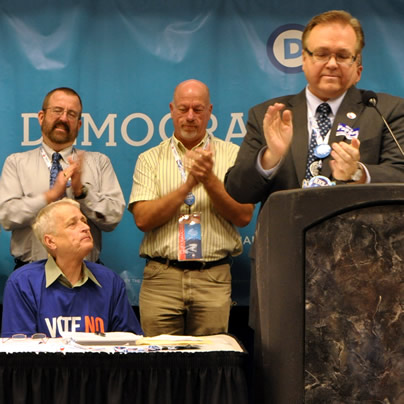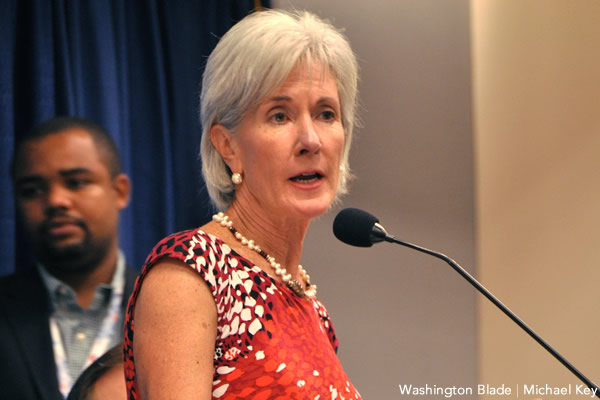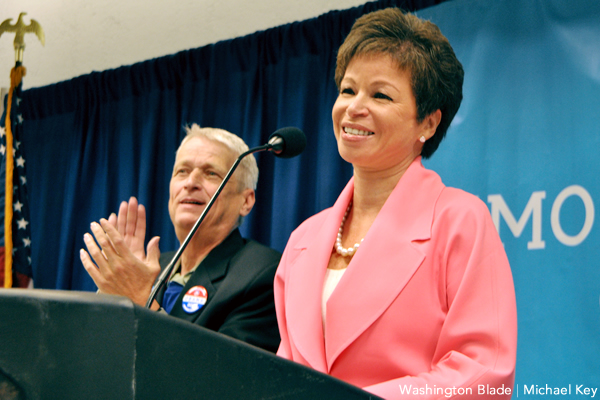National
DNC 2012: Jubilant LGBT delegates vow to support Obama
White House official, HHS Secretary among speakers at Caucus meeting


‘With a change in the White House much of the litany of what you’ve just heard is gone,’ said HHS Secretary Kathleen Sebelius said after listing some of President Obama’s LGBT-related accomplishments.
CHARLOTTE, N.C. — Hours before the Democratic National Convention’s opening session was called to order Tuesday night, a record number of more than 550 LGBT delegates, alternate delegates and convention committee members met as a recognized convention caucus.
Valerie Jarrett, White House Senior Adviser to the President; Kathleen Sebelius, Secretary of the U.S. Department of Health and Human Services; and Tammy Baldwin, the lesbian Democratic House member from Wisconsin who’s running for the U.S. Senate, were among a parade of elected officials and Democratic Party leaders to speak at the caucus meeting.
While greeting each of the speakers with loud applause, many of the LGBT delegates and convention participants said the big news of the day was the size of their caucus and its growth over the past two decades.
“History is being made this week,” said Minnesota gay delegate Rick Stafford, who serves as chair of the LGBT Caucus. “There’s over 550 LGBT Americans who are an official part of the 2012 Democratic National Convention.”
Stafford said that for the first time all 50 states have sent at least one or more LGBT delegates to a Democratic convention.
“Please let everyone know we are here to be seen and heard,” said Brandon Marcus, an out gay member of the North Carolina House of Representatives and one of 12 LGBT delegates and alternates from the Tar Heel state.

‘With your efforts we have been able to move our country forward,’ said Valerie Jarrett, White House senior adviser.
Marcus, who said he was proud to welcome his fellow LGBT convention participants to his home state, said he was certain that the cause for LGBT equality in North Carolina advanced this year despite the fact that voters passed Amendment 1, which added a provision to the state constitution banning same-sex marriage.
“The cause was not lost with Amendment 1,” he said.
Jarrett said efforts by the LGBT Caucus members and their supporters throughout the country on behalf of LGBT rights made it possible for the Obama administration to move forward with the president’s legislative and executive office initiatives on LGBT equality.
“With your efforts we have been able to move our country forward, I believe, in a fair way that respects everybody’s rights,” she said. “And that’s something that’s the foundation of our country and it’s something we can’t take for granted. We have to fight for it and make our country the more perfect union we know it can be.”
Jarrett received a prolonged, standing ovation when she added, “And I believe we are a more perfect union than we were four years ago.”
Sebelius said the repeal of the “Don’t Ask, Don’t Tell” law, which banned gays from serving openly in the military, and the passage by Congress of the Matthew Shepard and James Byrd Jr. Hate Crimes Prevention Act, which authorizes the federal government to prosecute anti-LGBT hate crimes, were an important part of the president’s legislative proposals.
But she said that due to opposition from the Republican-controlled House, most of the Obama administration’s achievements on LGBT rights came from directives from the president and federal agencies and departments under the president’s control.
Non-discrimination polices in federal housing programs, hospital visitation rights for same-sex partners, a ban on employment discrimination for transgender people in the federal workforce are among many of the Obama administration’s LGBT-related initiatives, members of the LGBT Caucus said.
“A lot of what you heard about today is not the law of the land,” Sebelius said. “It really is administrative rules and regulations that are in place and which can be wiped out in a heartbeat. With a change in the White House much of the litany of what you’ve just heard is gone.”
She said one task that LGBT Caucus members could take on to help ensure Obama’s re-election is to reach out to younger voters who support LGBT equality and other progressive causes in large numbers but who often don’t turn out to vote.
“Younger voters are enthusiastically in favor of equality for all,” she said. “But too many of them are not yet engaged in this election. They’re our voters but they are kind of sitting on the sidelines.
“So one of the things that has to be done in the next 63 days is, first, make sure they are registered and secondly get them to vote. And you all have a great microphone to do that – to talk to them about the LGBT issues at stake,” Sebelius said.
Baldwin is scheduled to address the convention Thursday night before President Obama and Vice President Joe Biden deliver their respective speeches. She told the LGBT Caucus she would provide needed support for the president’s initiatives on a wide range of issues, including LGBT equality and health care, if she wins her Senate race.
She said she believes she has a “very close” race against her GOP opponent, former Wisconsin Gov. Tommy Thompson.
Some political observers have said Thompson, considered a GOP moderate on social issues, emerged as the strongest Republican opponent to run against Baldwin when he won the GOP primary.
“An election is about who writes the rules and who benefits from them,” Baldwin said.
Others who spoke before the LGBT Caucus meeting were Randi Weingarten, the lesbian president of the American Federation of Teachers; Brian Bond, the gay director of constituent outreach at the Democratic National Committee and former deputy director of the White House Office of Public Engagement; Andy Tobias, the gay DNC treasurer; Ray Buckley, the gay chair of the New Hampshire Democratic Party; and Steve Kerrigan, the gay CEO of the 2012 Democratic Convention.
A second LGBT Caucus meeting is scheduled to take place Thursday.
As of late Tuesday, convention officials had yet to release a list of the names of the LGBT Caucus members. The Democratic National Committee has not responded to a Washington Blade request for that list.
Stafford and Jerame Davis, executive director of the National Stonewall Democrats, said they have independently compiled their own list of LGBT Caucus members. They said they would consider releasing their lists but did not do so as of Tuesday.
Gay alternate delegate David Meadows of D.C. said he would raise objections to any decision by party officials to withhold the names of the LGBT delegates and other LGBT convention participants.
“All of us checked a box saying we were part of the LGBT community,” Meadows said. “All of us self-disclosed who we are. It makes no sense to withhold the names.”
Meadows was referring to a form that the DNC asked all state parties circulate to Democrats seeking to become delegates to the 2012 convention. The form was part of an effort to assess the party’s outreach to various minorities, including LGBT people.

The Comings & Goings column is about sharing the professional successes of our community. We want to recognize those landing new jobs, new clients for their business, joining boards of organizations and other achievements. Please share your successes with us at [email protected].
Congratulations to Gil Pontes III on his recent appointment to the Financial Advisory Board for the City of Wilton Manors, Fla. Upon being appointed he said, “I’m honored to join the Financial Advisory Board for the City of Wilton Manors at such an important moment for our community. In my role as Executive Director of the NextGen Chamber of Commerce, I spend much of my time focused on economic growth, fiscal sustainability, and the long-term competitiveness of emerging business leaders. I look forward to bringing that perspective to Wilton Manors — helping ensure responsible stewardship of public resources while supporting a vibrant, inclusive local economy.”
Pontes is a nonprofit executive with years of development, operations, budget, management, and strategic planning experience in 501(c)(3), 501(c)(4), and political organizations. Pontes is currently executive director of NextGen, Chamber of Commerce. NextGen Chamber’s mission is to “empower emerging business leaders by generating insights, encouraging engagement, and nurturing leadership development to shape the future economy.” Prior to that he served as managing director of The Nora Project, and director of development also at The Nora Project. He has held a number of other positions including Major Gifts Officer, Thundermist Health Center, and has worked in both real estate and banking including as Business Solutions Adviser, Ironwood Financial. For three years he was a Selectman, Town of Berkley, Mass. In that role, he managed HR and general governance for town government. There were 200+ staff and 6,500 constituents. He balanced a $20,000,000 budget annually, established an Economic Development Committee, and hired the first town administrator.
Pontes earned his bachelor’s degree in political science from the University of Massachusetts, Dartmouth.
Kansas
ACLU sues Kansas over law invalidating trans residents’ IDs
A new Kansas bill requires transgender residents to have their driver’s licenses reflect their sex assigned at birth, invalidating current licenses.

Transgender people across Kansas received letters in the mail on Wednesday demanding the immediate surrender of their driver’s licenses following passage of one of the harshest transgender bathroom bans in the nation. Now the American Civil Liberties Union is filing a lawsuit to block the ban and protect transgender residents from what advocates describe as “sweeping” and “punitive” consequences.
Independent journalist Erin Reed broke the story Wednesday after lawmakers approved House Substitute for Senate Bill 244. In her reporting, Reed included a photo of the letter sent to transgender Kansans, requiring them to obtain a driver’s license that reflects their sex assigned at birth rather than the gender with which they identify.
According to the reporting, transgender Kansans must surrender their driver’s licenses and that their current credentials — regardless of expiration date — will be considered invalid upon the law’s publication. The move effectively nullifies previously issued identification documents, creating immediate uncertainty for those impacted.
House Substitute for Senate Bill 244 also stipulates that any transgender person caught driving without a valid license could face a class B misdemeanor, punishable by up to six months in jail and a $1,000 fine. That potential penalty adds a criminal dimension to what began as an administrative action. It also compounds the legal risks for transgender Kansans, as the state already requires county jails to house inmates according to sex assigned at birth — a policy that advocates say can place transgender detainees at heightened risk.
Beyond identification issues, SB 244 not only bans transgender people from using restrooms that match their gender identity in government buildings — including libraries, courthouses, state parks, hospitals, and interstate rest stops — with the possibility for criminal penalties, but also allows for what critics have described as a “bathroom bounty hunter” provision. The measure permits anyone who encounters a transgender person in a restroom — including potentially in private businesses — to sue them for large sums of money, dramatically expanding the scope of enforcement beyond government authorities.
The lawsuit challenging SB 244 was filed today in the District Court of Douglas County on behalf of anonymous plaintiffs Daniel Doe and Matthew Moe by the American Civil Liberties Union, the ACLU of Kansas, and Ballard Spahr LLP. The complaint argues that SB 244 violates the Kansas Constitution’s protections for personal autonomy, privacy, equality under the law, due process, and freedom of speech.
Additionally, the American Civil Liberties Union filed a temporary restraining order on behalf of the anonymous plaintiffs, arguing that the order — followed by a temporary injunction — is necessary to prevent the “irreparable harm” that would result from SB 244.
State Rep. Abi Boatman, a Wichita Democrat and the only transgender member of the Kansas Legislature, told the Kansas City Star on Wednesday that “persecution is the point.”
“This legislation is a direct attack on the dignity and humanity of transgender Kansans,” said Monica Bennett, legal director of the ACLU of Kansas. “It undermines our state’s strong constitutional protections against government overreach and persecution.”
“SB 244 is a cruel and craven threat to public safety all in the name of fostering fear, division, and paranoia,” said Harper Seldin, senior staff attorney for the ACLU’s LGBTQ & HIV Rights Project. “The invalidation of state-issued IDs threatens to out transgender people against their will every time they apply for a job, rent an apartment, or interact with police. Taken as a whole, SB 244 is a transparent attempt to deny transgender people autonomy over their own identities and push them out of public life altogether.”
“SB 244 presents a state-sanctioned attack on transgender people aimed at silencing, dehumanizing, and alienating Kansans whose gender identity does not conform to the state legislature’s preferences,” said Heather St. Clair, a Ballard Spahr litigator working on the case. “Ballard Spahr is committed to standing with the ACLU and the plaintiffs in fighting on behalf of transgender Kansans for a remedy against the injustices presented by SB 244, and is dedicated to protecting the constitutional rights jeopardized by this new law.”
National
After layoffs at Advocate, parent company acquires ‘Them’ from Conde Nast
Top editorial staff let go last week

Former staff members at the Advocate and Out magazines revealed that parent company Equalpride laid off a number of employees late last week.
Those let go included Advocate editor-in-chief Alex Cooper, Pride.com editor-in-chief Rachel Shatto, brand partnerships manager Erin Manley, community editor Marie-Adélina de la Ferriére, and Out magazine staff writers Moises Mendez and Bernardo Sim, according to a report in Hollywood Reporter.
Cooper, who joined the company in 2021, posted to social media that, “Few people have had the privilege of leading this legendary LGBTQ+ news outlet, and I’m deeply honored to have been one of them. To my team: thank you for the last four years. You’ve been the best. For those also affected today, please let me know how I can support you.”
The Advocate’s PR firm when reached by the Blade said it no longer represents the company. Emails to the Advocate went unanswered.
Equalpride on Friday announced it acquired “Them,” a digital LGBTQ outlet founded in 2017 by Conde Nast.
“Equalpride exists to elevate, celebrate and protect LGBTQ+ storytelling at scale,” Equalpride CEO Mark Berryhill said according to Hollywood Reporter. “By combining the strengths of our brands with this respected digital platform, we’re creating a unified ecosystem that delivers even more impact for our audiences, advertisers, and community partners.”
It’s not clear if “Them” staff would take over editorial responsibilities for the Advocate and Out.
















